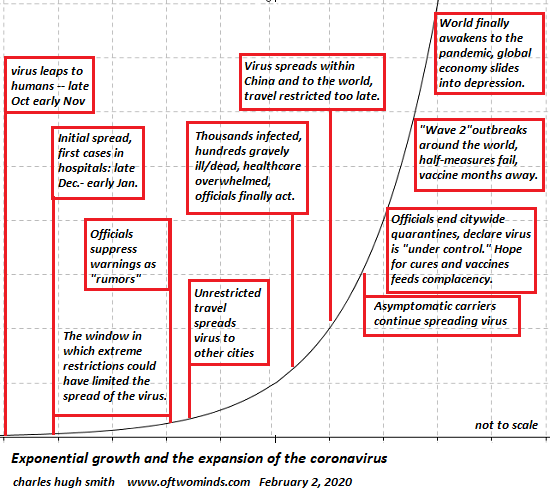It's too early to declare victory and too early to assume the virus can be completely eradicated in a few weeks on the SARS model.
Many people are already anticipating the end of the coronavirus pandemic and a quick return to "normal life" and renewed global growth. But if we examine the history of previous pandemics and the spread of this contagious virus, we reach a much different conclusion: "Wave 2" and "Wave 3" arising after the initial wave recedes are distinct possibilities.
The corporate media and conventional economists in the U.S. and China's PR machine share a common goal: reassure consumers in the U.S., China and the rest of the world that everything will return to normal soon and they should continue buying stuff they don't need (5G phones, etc.) with borrowed money.
Meanwhile, authorities in China are tracking down everyone with a Wuhan residency ID card in the hopes that quarantining every one of the tens of thousands of Wuhan residents who traveled before the citywide quarantine took effect will stop the pandemic.
There are two problems with this official assumption that house-arresting everyone from Wuhan will end the pandemic:
1. Given that Wuhan residents traveled freely around China for the month before the citywide quarantine, infecting people in other cities, there is now a pool of carriers who did not come from Wuhan, so quarantining everyone from Wuhan won't stop these people from infecting others.
2. Much of the dirty, poorly paid work in China's cities is done by "illegal migrants" from rural areas who don't have official residency in the city. These people may have lived and worked in Wuhan but do not have Wuhan ID cards. They make up another reservoir of virus carriers who it will be difficult to track down and quarantine via residency permits and ID.
As mentioned previously, many of the hundreds of thousands of Chinese with overseas jobs returned home for New Years and are now anxious to get back to their jobs in other countries. Those without symptoms who are outside locked-down cities are free to find "work-arounds" to exit China by whatever means are available. Some consequential percentage of these people might be asymptomatic carriers of the virus.
As the city-wide quarantines limit the spread of the virus, victory will be declared and the quarantines will be lifted. But since the reservoirs of the virus have not been eliminated, the virus will start spreading again once the quarantines are lifted. This is "Wave 2."
Pandemics tend to decline in summer and then re-emerge in Fall. These renewed pandemics may be even more consequential than the first wave.
If an effective vaccine is developed and billions of doses are made and distributed globally by Fall, then a re-emergence will have been thwarted. But that's a tall order, and there may be areas where the vaccine (assuming one is developed) is not universally distributed.
A re-emergence in Fall would be "Wave 3." Perhaps this wave will be limited to impoverished nations without adequate healthcare systems; perhaps the virus mutates in some unexpected way. It's too early to declare victory and too early to assume the virus can be completely eradicated in a few weeks on the SARS model.
 My recent books:
My recent books:
NOTE: Contributions/subscriptions are acknowledged in the order received. Your name and email remain confidential and will not be given to any other individual, company or agency.
Thank you, William H. ($50), for your magnificently generous contribution to this site -- I am greatly honored by your steadfast support and readership.
| |
Thank you, Melissa B. ($10/month), for your outrageously generous subscription to this site -- I am greatly honored by your support and readership.
|




























